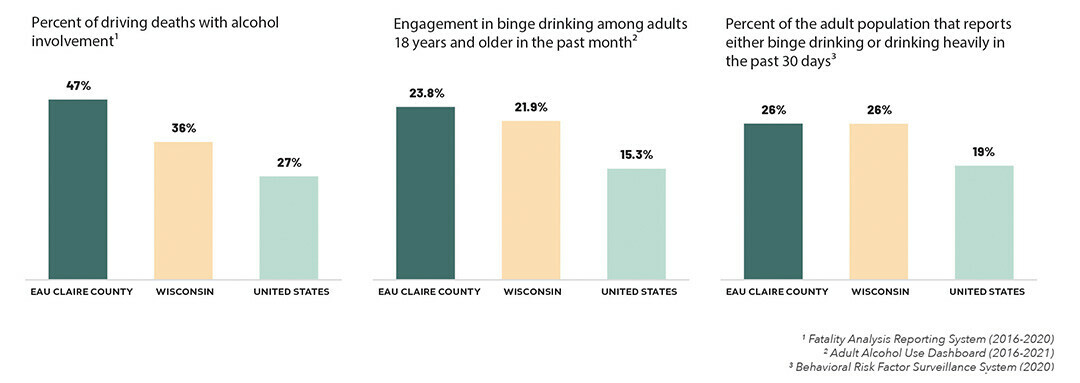Alcohol Misuse Tops List of E.C. County Health Concerns
data says alcohol more problematic here than in state, nation

Online lists ranking Eau Claire as one of the nation’s drunkest cities may be good for grabbing headlines, but they may not just be college-town hyperbole. Alcohol misuse was ranked as Eau Claire County’s No. 1 health priority in a just-released Community Health Assessment prepared by a partnership of local health departments, medical systems, and other organizations.
Assessments are conducted at three-year intervals, and alcohol misuse rose from the No. 3 priority it held in 2021, 2018, and 2015. This time around, the top five priorities were listed as:
- Alcohol Misuse
- Poor Mental Health
- Lack of Access to Childcare or Unaffordable Childcare
- Substance Misuse
- Lack of Safe or Affordable Housing
As the 2024 assessment was conducted over the past year, alcohol misuse was identified as a major concern among county residents who responded to a survey, by participants in the Eau Claire Health Alliance who took part in meetings, and in data gathered from state and national databases.
According to that hard data, alcohol misuse appears to be worse among Eau Claire County residents than among Wisconsinites and Americans as a whole. For example, 47% of driving deaths in the county between 2016-20 involved alcohol, compared with 38% statewide and 27% nationwide. Likewise, 23.8% of Eau Claire County adults were binge drinkers, compared with about 22% of Wisconsinites and 15% of Americans.

Alex Craker, a public health planner with the Eau Claire City-County Health Department, said the ranking doesn’t necessarily mean that alcohol abuse is worsening in the county.
“It’s not a sudden new thing that we’ve never seen before,” he explained. “It’s shown up on our reports, (and) it’s noted throughout the community that this is a cultural thing that we should be working on.”
Craker said the assessment is meant “as kind of a pulse check of how the community is doing.” For entities such as the health department, he said, the findings impact the grants they pursue and the programs they endorse. Health coalitions in each county – which include a broad range of organizations and individuals – also use the assessment as a way to help improve community health.
Alcohol misuse appeared among the top health priorities in all three local counties – Eau Claire, Chippewa, and Dunn – as did childcare access. “Poor mental health” was deemed a top priority in Chippewa and Eau Claire counties, while “health care is difficult to access” was on the list for both Chippewa and Dunn counties.
The report noted that most of the data used in the assessment was collected before the announcement in January that Sacred Heart and St. Joseph’s hospitals and Prevea clinics would close. The loss of these institutions and related facilities – including an inpatient detox center – will undoubtedly have a far-reaching impact on the region’s health, the report said.
Data used to identify the top issues in Eau Claire County came from a survey of people who live and/or work in the county; state and national databases; discussions with groups and individuals in the county; and meetings with the Eau Claire Health Alliance Coalition.
The health assessments can be found online at bit.ly/2024chipassessment (Chippewa County), bit.ly/2024dunnassessment (Dunn County), and bit.ly/2024ecassessment (Eau Claire County).


















